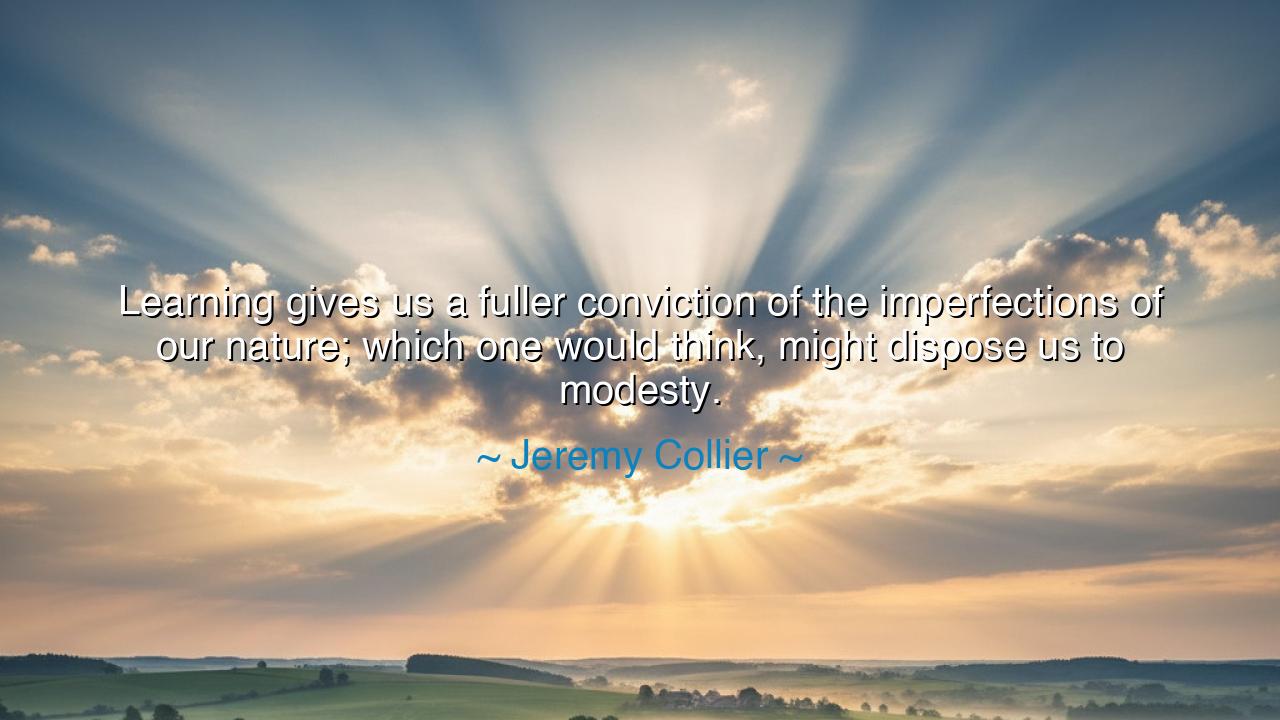
Learning gives us a fuller conviction of the imperfections of our
Learning gives us a fuller conviction of the imperfections of our nature; which one would think, might dispose us to modesty.






There are truths that humble the human spirit — truths that reveal not our greatness, but our smallness before the vastness of wisdom. Jeremy Collier, a moralist and thinker of the late seventeenth century, once wrote: “Learning gives us a fuller conviction of the imperfections of our nature; which one would think, might dispose us to modesty.” In these words lies the essence of what the ancients called the paradox of knowledge: that the more we learn, the more we perceive how little we truly know. True learning, Collier tells us, is not the ascent of pride but the descent into humility.
The meaning of this quote strikes at the heart of wisdom itself. To learn deeply is to discover one’s limits — to see how frail human understanding is beside the infinite mystery of truth. The ignorant man believes himself wise because his vision is narrow; the learned man grows modest because his horizon expands. Knowledge opens doors, but each door leads to greater complexity, revealing how small our grasp of existence truly is. Thus, learning, when honest and sincere, humbles rather than inflates. It strips away illusion and forces us to stand bare before the immensity of creation.
The origin of Collier’s insight lies in the intellectual and spiritual awakening of his time — an age when science and philosophy were flourishing, yet often clashing with faith. He witnessed men who, newly armed with learning, grew arrogant, believing themselves masters of reason and the world. Collier, a man of moral clarity, warned that true scholarship should cultivate reverence, not pride. To know more of nature and man’s soul, he argued, was to be more aware of imperfection — to see, as Socrates once did, that wisdom begins with the confession of ignorance.
This truth is eternal and universal. Consider Isaac Newton, who discovered the laws of motion and gravity — truths that changed the world. Yet Newton, in his later years, wrote, “I do not know what I may appear to the world; but to myself, I seem to have been only like a boy playing on the seashore… finding a smoother pebble or a prettier shell, while the great ocean of truth lay all undiscovered before me.” Such words could have been spoken by Collier himself. They show that the mind that truly seeks understanding cannot help but bow in awe before the infinite.
The danger Collier warns against is the arrogance of half-learning — that shallow brilliance which dazzles but blinds. When men acquire fragments of knowledge without depth, they often mistake information for wisdom and grow proud in their ignorance. But the deeper one studies — in art, in science, in philosophy — the clearer one sees the cracks in human reasoning, the frailty of perception, the uncertainty of truth. Learning, then, becomes an act of humility, for it reveals that perfection is beyond reach, and that all human effort is but a striving toward the divine.
In this way, Collier’s words carry a moral challenge: that education is not merely for the sharpening of intellect, but for the refining of character. Modesty is the crown of the wise — a modesty that recognizes that even the brightest flame flickers in the wind of eternity. The greatest scholars, saints, and artists have always known this. They did not boast of their insight; they served it. Their learning made them gentle, patient, and compassionate toward the folly of others, for they had come face to face with the folly within themselves.
Let this teaching be taken to heart: if your learning makes you proud, you have learned only the surface of things; but if it makes you humble, you have begun to understand. Seek knowledge not to elevate yourself, but to better your soul. Let what you discover remind you of the mystery that still surrounds you. Be modest in your words, reverent in your thoughts, and kind in your judgments. For in the end, the wisest among us are not those who claim certainty, but those who — like Jeremy Collier — have learned that every step toward truth is also a step toward humility, and that in recognizing our imperfection, we draw nearest to the perfection we seek.






AAdministratorAdministrator
Welcome, honored guests. Please leave a comment, we will respond soon